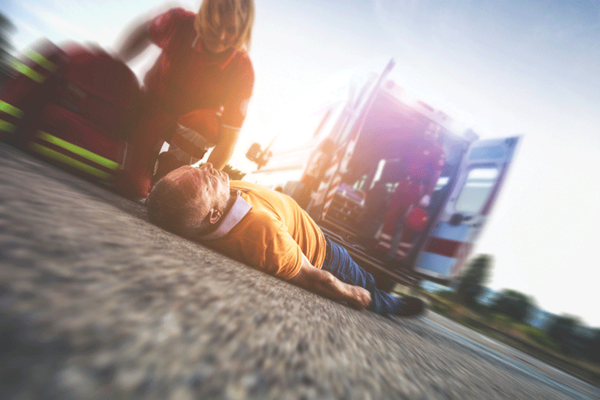Pre-hospital medicine offers unique opportunities to an EM physician, and EMS training complements the emergency medicine curriculum. You don't have to become an EMS fellow to appreciate that an understanding of what happens outside of the hospital translates to better care within the hospital. While it can be easy to oversimplify the role of EMS providers, there are some points worth considering, and if we take time to learn from the pre-hospital setting, our careers in emergency medicine will be better for it.
Clinical skills
Emergency medicine and pre-hospital medicine are complementary fields. Basic history taking and physical exam skills are the foundation for clinical decisions in both lines of work. Outside of the hospital, there is limited access to diagnostic tools, necessitating the need to trust what you see and hear. In these situations it becomes more important for the clinician to acknowledge abnormal findings quickly, and to trust clinical instincts, something we rely upon in the ED as well. Residency education may occasionally de-emphasize important procedures like high-quality CPR, IV starts, medication administration, ECG acquisition, and hemorrhage control. A solid EMS experience allows you to focus on these procedures, which better prepares you for any medical setting.
Undifferentiated patients
In most scenarios EMS providers have only the dispatch information when they arrive on scene. This forces them to quickly contextualize the limited information and translate it to important decisions, including what equipment will be needed outside of the rig. Patients will often have only minimal insight into their situation, which necessitates development of an efficient method of gathering and synthesizing information to create a plan. This rapid decision-making is an important skill, both in pre-hospital medicine and in the ED.
There are sometimes subtle environmental clues, only available to the EMS provider, that aid in the ability to rapidly identify the best course of treatment. For example, a provider noting a running kerosene heater in the corner of a patient's cold apartment could dramatically change the clinical course of care. This is also true for small tip-offs found on the physical exam. Quickly identifying stigmata of IV drug abuse can prompt a rapid reversal of opiate intoxication; if missed, it could lead to a respiratory arrest and code situation.
Working in the field forces you to make decisions under a unique set of circumstances, and in settings only found outside of the “controlled” ED environment. Skills in both fields translate well to the other. EMS forces you to experience decision-making in a resource-limited setting. Formulation of a differential, choice of a treatment plan, and decisions of where and how to transport are often made much more rapidly than in an ED.
Untreated patients
Patients frequently look much different in their natural environment than they do when they arrive in the ED. An amp of D50, a liter of fluid, or a nasal cannula can transform the most critically-ill-appearing patient into one who is pleasant and conversant. I repeatedly hear EMS personnel say, “The patient looked so much worse before we got here.” These providers transform a patient from chaos to comfort. It's important to remember that patients can be significantly better by the time they arrive in your ER.
We treat acute illness on a day-to-day basis. It is vital to see patients at their first point of contact with the medical system, as their apparent acuity may change drastically. Through EMS experiences we observe the trajectory of illness change between initial presentation and arrival, and this informs our bedside practice.
The community
Pre-hospital and EMS providers speak to many different professionals who possess varying degrees of knowledge and different perspectives. Interactions with police, firefighters, and public works officials require different language and cultural norms. Gaining the trust of other service agencies can make pre-hospital medicine easier and safer for the patient. Police may provide cover for a patient extraction; firefighters may help gain access to the patient trapped within a house fire.
Similarly, in the ED we speak with different specialists and disciplines every day. Becoming comfortable interacting with your techs, nurses, subspecialists, and other ED physicians is necessary to deliver effective patient care. The interpersonal skills in both fields complement each other; improving the ability to communicate across boundaries is critical for our patients.
Quality assurance
As emergency physicians, we supply quality assurance for EMS calls. ED physicians provide oversight, review of calls, establishment of metrics, and consideration of system-level data to decide if reasonable care is being provided. We are instrumental in developing EMS metrics, from call and scene review to performance evaluations. EMS Q&A provides the opportunity to be involved in systems and operations feedback and evaluate the measurements of “quality” – skills that are important during a medical career. Critique and analysis of the medical care provided to our patients allow for a more inclusive model of medicine and improved outcomes.
Leadership
EMS exposure during residency allows residents to lead teams of health care professionals in advancement of patient care and quality assurance. These leadership skills can translate well to other situations. EMS and pre-hospital medicine gives us the opportunity to step up and direct patient care with different teams. EMS experience sharpens teamwork and leadership skills, and in turn allows delivery of more effective care in the ED.
Emergency medicine leads the way in pre-hospital medicine and holds a leadership position in the EMS community. This provides an invaluable opportunity for residents in training. Lessons learned in the field easily apply to the traditional clinical environment and allow EM residents to grow. Residents who seek out EMS experiences will broaden their education and gain valuable skills. Residencies that include EMS as part of their curriculum will produce better residents and stronger leaders.



